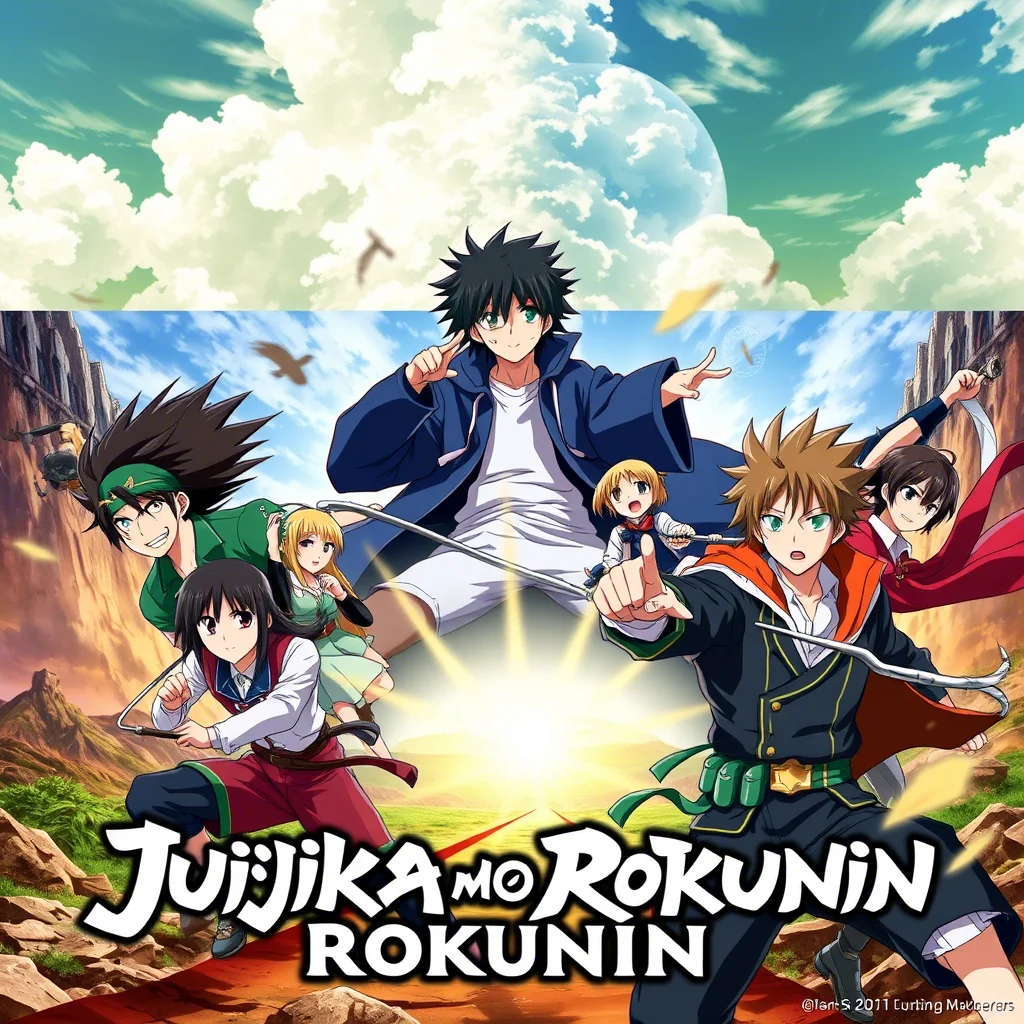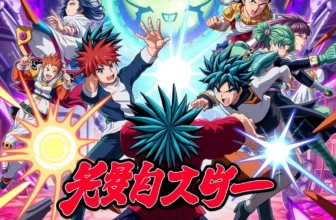
In the ever-evolving world of anime, 2025 is shaping up to be an exciting year, especially for fans of dark, psychological thrillers. One of the most anticipated anime releases is Juujika no Rokunin (The Six Criminals), a TV mini-series based on the popular manga of the same name. The story promises to deliver intense, dramatic moments alongside complex character studies, blending action, mystery, and moral ambiguity. For fans of thrillers and psychological drama, Juujika no Rokunin could easily become one of the standout anime of the year.
In this article, we’ll break down the anime in its entirety—discussing its story, themes, characters, animation style, and more—while giving you everything you need to know about this upcoming mini-series.
What is Juujika no Rokunin (The Six Criminals)?
At its core, Juujika no Rokunin (The Six Criminals) is a gripping, character-driven thriller. The story revolves around six individuals, each with a deeply troubled past and morally questionable actions. The anime doesn’t shy away from themes of justice, retribution, and the human psyche when pushed to extremes.
The narrative itself is far from simple; it’s a dark exploration of how far people will go to avenge their wrongdoings, the extent to which trauma can shape behavior, and how every decision can spiral into consequences that one might not expect.
Setting: The world of Juujika no Rokunin is not your typical setting for a thriller. It is a harsh, gritty landscape where crime is rampant, and the justice system is not always on the side of those who seek it. The series takes place in an urban environment that mirrors the emotional and moral decay that each of the main characters faces. While not explicitly dystopian, it’s clear that the world has become morally skewed, with the line between right and wrong often blurred.
Plot Synopsis:
The anime centers around six protagonists, each of whom has a dark past. These individuals have been brought together by fate, their lives intersecting in the aftermath of a traumatic event. The core conflict emerges when these characters are forced to confront their pasts and, more specifically, the violent acts they have committed.
As the story unfolds, we learn that each of these six characters is responsible for a heinous crime. However, the true nature of these crimes and the motivations behind them remain shrouded in mystery. The mini-series is designed to keep viewers on edge, teasing out the backstories of these characters slowly while highlighting their psychological deterioration as they struggle with guilt, anger, and vengeance.
What sets Juujika no Rokunin apart is its refusal to offer easy answers. Rather than painting its characters as purely good or evil, the series dives into their complex moral dilemmas, forcing the audience to empathize with them—even as they commit questionable acts.
Characters:
1. Tatsumi Shishigami:
The main protagonist, Tatsumi is a deeply troubled individual, scarred by a series of violent events in his past. His desire for vengeance and justice is palpable, but his methods are often extreme. As the leader of the group, Tatsumi’s backstory is essential to understanding the series’ larger themes. His trauma and the resulting guilt weigh heavily on him, creating an internal conflict between wanting justice for those he’s wronged and realizing the costs of that justice.
2. Kyouko Yoshida:
Kyouko is one of the more enigmatic characters in Juujika no Rokunin. She harbors a deep resentment for the world around her, fueled by years of abuse and loss. Her role in the group is initially unclear, and her motivations seem to shift constantly. Kyouko’s moral compass is shattered, and she finds herself caught between following Tatsumi’s lead or carving her own path to personal redemption.
3. Reiji Ikeda:
A man who thrives in chaos, Reiji is a wildcard in the group. His past is filled with bloodshed, and he has grown numb to the violence around him. Reiji’s role within the group is one of muscle, but he’s also someone who grapples with internal rage. His relationships with other members of the group are strained, as he struggles with his feelings of superiority and inferiority at the same time.
4. Mikako Suzuki:
The quiet observer of the group, Mikako is an intelligent woman who seeks to hide her past behind an emotionless facade. Beneath her stoic exterior, however, is a woman plagued by guilt. Her history with manipulation and deceit makes her one of the more morally gray characters in the series. Mikako is not afraid to make cold, calculated decisions, even if they come at the cost of her humanity.
5. Shinji Takeda:
Shinji is a former law enforcement officer who now operates on the other side of the law. Having lost faith in the justice system, he feels that his moral duty lies in taking matters into his own hands. His character is a fascinating study in how someone can become disillusioned by a flawed system and end up becoming as corrupt as the people they once fought against.
6. Yuka Hasegawa:
Yuka is an unlikely member of the group—a young woman with a tragic past. She is the most empathetic and emotionally vulnerable of the six, yet she has the capacity to commit extreme acts of violence when pushed to her limits. Yuka’s personal journey is one of self-discovery, as she confronts her own demons and the consequences of her actions.
Themes:
1. Justice vs. Revenge:
At the heart of Juujika no Rokunin is the question of justice versus revenge. The characters are all motivated by a sense of needing to “right” the wrongs that have been done to them or those they care about. However, the series consistently challenges the notion of what true justice is, especially when the protagonists begin to resort to morally ambiguous tactics to achieve their goals.
The central characters often find themselves crossing the line between justified action and immoral retribution, questioning whether their pursuit of vengeance is truly the answer.
2. Moral Ambiguity:
One of the defining features of Juujika no Rokunin is its exploration of moral ambiguity. There are no clear-cut heroes or villains in this story. Each character has their reasons for their actions, and their complex personalities create a narrative where viewers are constantly asked to judge what is right or wrong.
The anime’s refusal to label its characters as simply “good” or “bad” is one of its most compelling aspects. Instead, it forces the audience to explore the gray areas of morality, asking difficult questions about what it means to be a criminal, a victim, or a hero.
3. Psychological Trauma:
Another central theme of Juujika no Rokunin is the exploration of psychological trauma and its lasting effects on the human psyche. The characters all carry deep emotional wounds from their past experiences, and these wounds shape their behavior throughout the series. Their individual traumas manifest in different ways, from anger and violence to isolation and emotional numbness.
By focusing on the psychological scars of its characters, the series provides a nuanced look at how trauma can shape a person’s identity, moral choices, and actions.
Animation Style and Visuals:
The visual style of Juujika no Rokunin is gritty, realistic, and often dark, reflecting the psychological tension and emotional weight of the story. The animation is designed to amplify the harshness of the characters’ world and their internal struggles. Expect a lot of moody, shadowy scenes, particularly during key moments of introspection or when the characters are involved in violent confrontations.
The character designs are also notable, with each of the six protagonists being visually distinct, which helps to emphasize their individuality and personalities. The animation studios behind Juujika no Rokunin have opted for a more subdued color palette that reflects the grim tone of the series.
In addition to the atmospheric visuals, the action scenes are intense and well-choreographed, adding to the sense of urgency and danger that surrounds the characters. These sequences are not just action for the sake of spectacle but are tied to the emotional arcs of the characters.
What to Expect:
As a TV mini-series, Juujika no Rokunin promises a tight, focused narrative, meaning viewers can expect each episode to be packed with character development, emotional conflict, and plenty of twists. The show will likely be filled with moments of high tension and contemplation, as it forces its characters to face the consequences of their pasts while dealing with the present.
Given the dark and mature themes, the show will likely appeal to an audience that enjoys complex, psychological narratives—think of it as a deep dive into the human condition, where every action has a moral consequence, and redemption is never guaranteed.
Conclusion:
Juujika no Rokunin (The Six Criminals) promises to be one of the most intriguing anime series of 2025. Its exploration of complex moral themes, psychological depth, and intense character drama sets it apart from other series in the thriller and psychological genres. With a focus on trauma, vengeance, and the consequences of one’s actions, this mini-series will undoubtedly leave a lasting impression on its audience.



